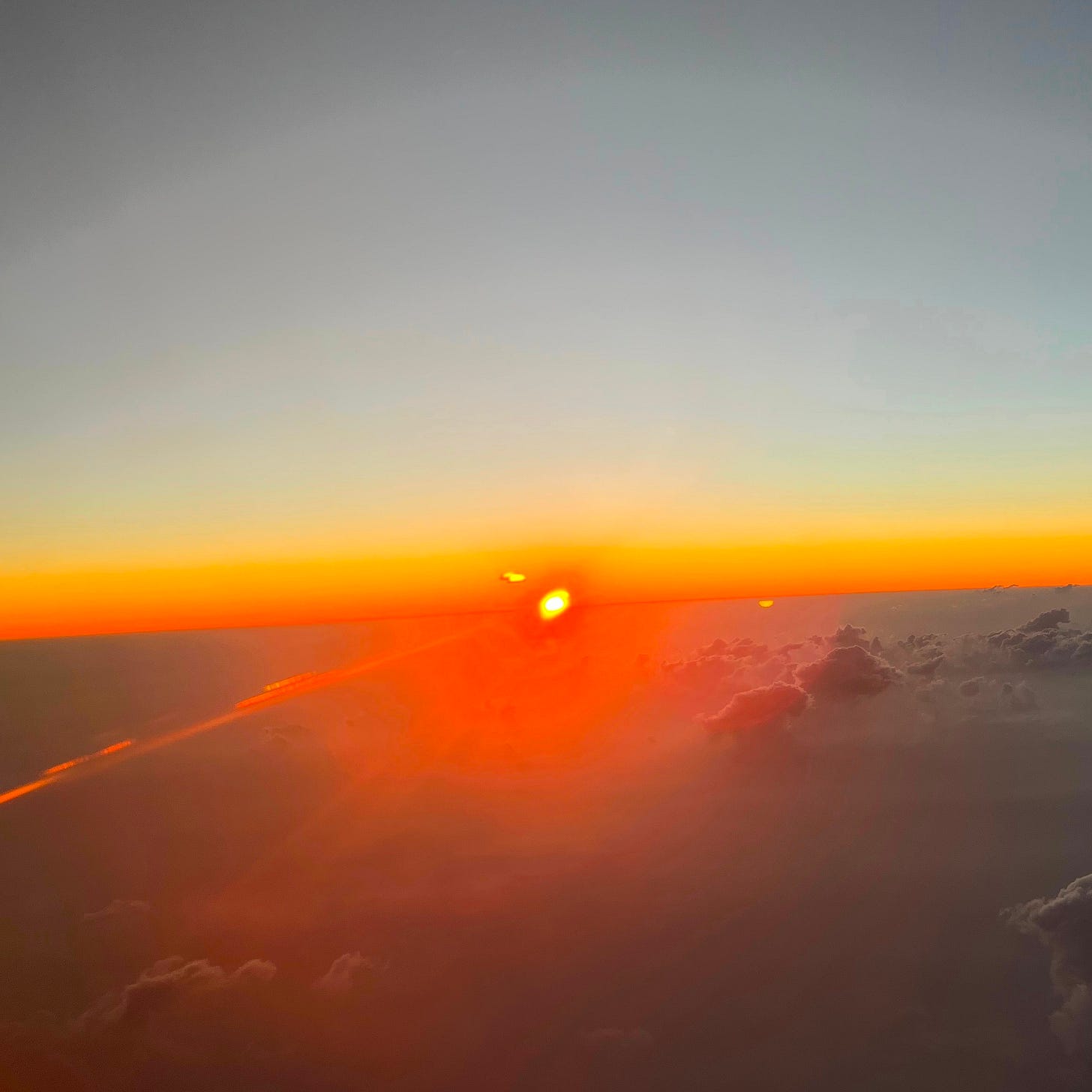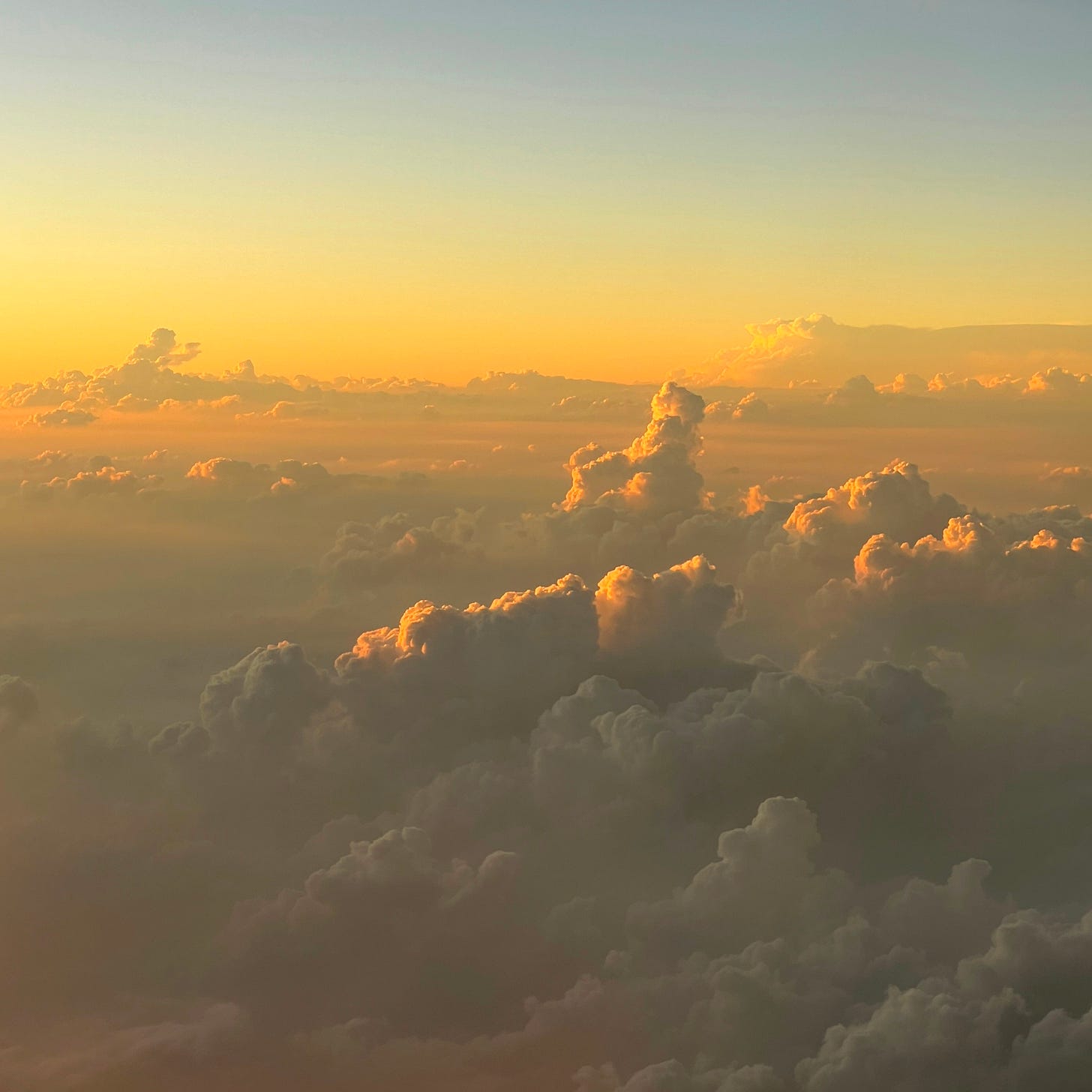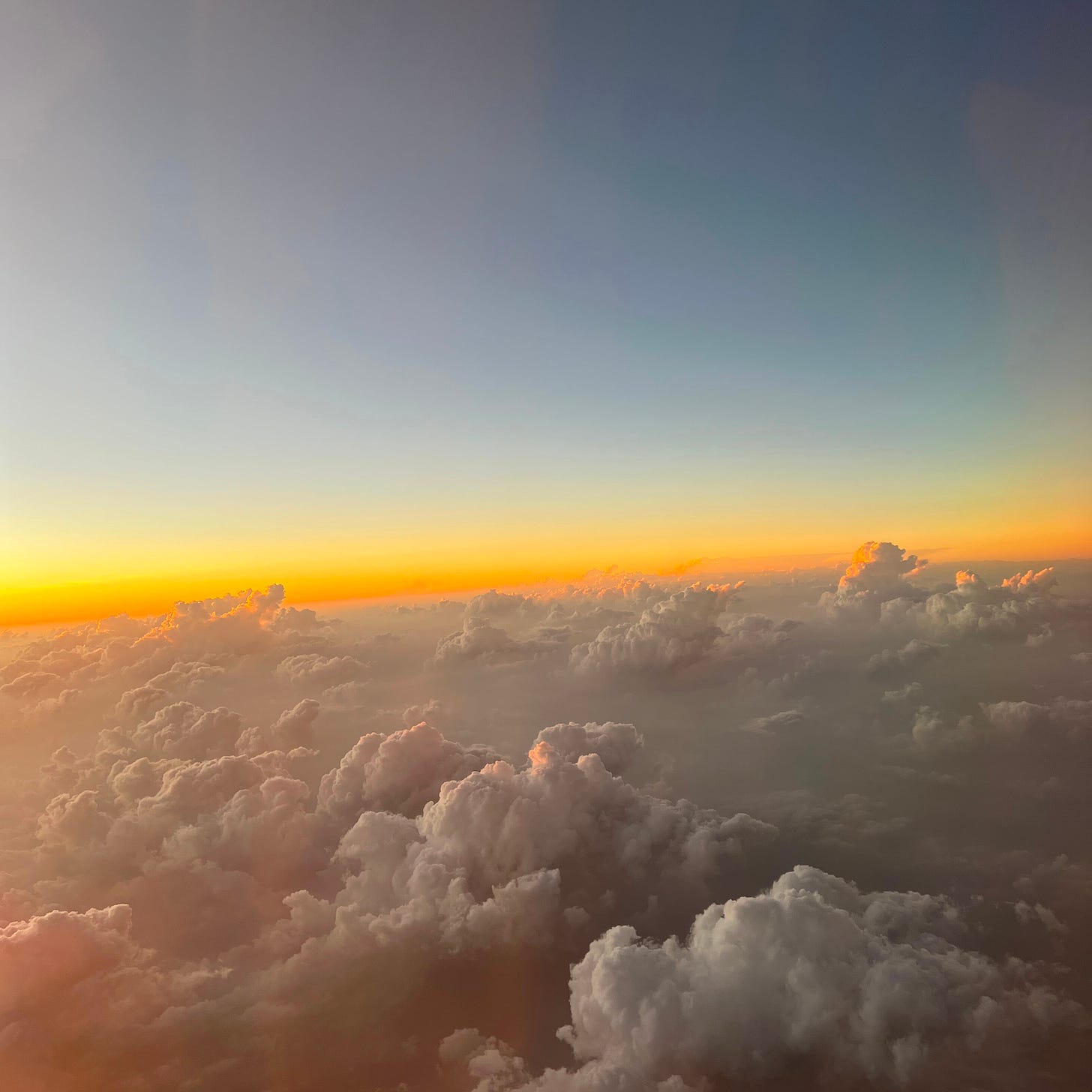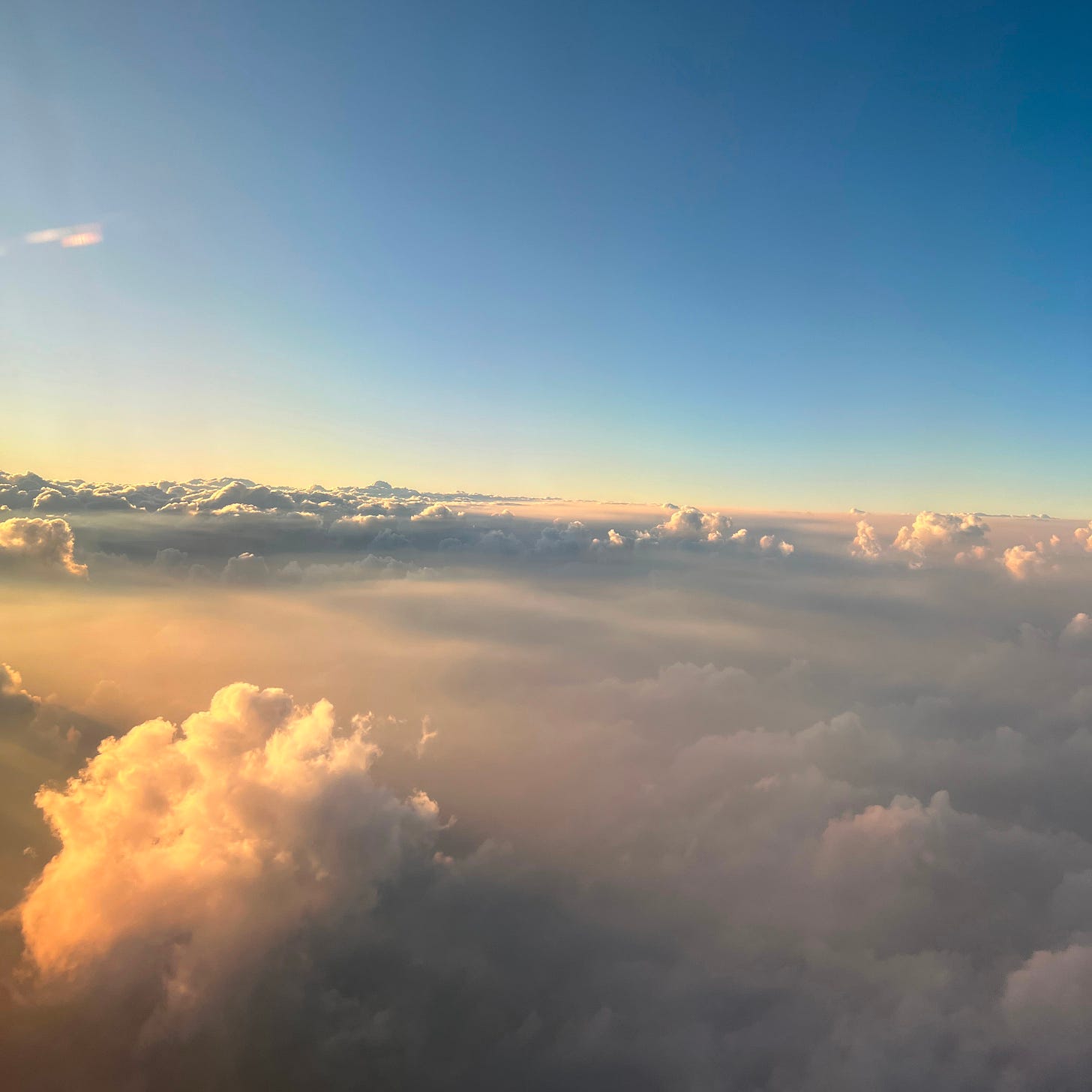Lessons learned at the liminal edge of death
A first entrée of reflections on what I learned from being in liminality between life and death.
Earlier this week, my mother died.
The last time I wrote, she was in ailing health, and I had no idea I was about to inhabit this limbo space of negotiating with Lady Death along her spirit since July. Still, the insights and seed ideas I received in these last months are a gold-filled river that I’ll be returning several times to come.
The irony of naming my newsletter On Liminality isn’t lost on me. Soon after launching it, I’m thrown into the deep end of this Liminal river, swimming the currents of aging, illness, the pain of unlived aspects of life, regrets, the armor of pride, and the soul reckoning truths that Lady Death’s negotiating chops reveal.
Astrologically speaking, it all kicked off for me with the conjunction of Uranus and the star Algol - the Demon’s head - right on my Ascendant and wrapped up this part of the story at the tail-end of this latest eclipse season of Aries/Libra. Uranus came as a cosmic pair of scissors cutting the psychological attachments that had become parasitic to my sense of self - a liberating force.
While my mother negotiated with Lady Death in the hospital for the past three months, until her final surrender this week, I, too, inhabited the Underworld of limbo alongside her soul. I could do the necessary surface work, but a part of me wasn’t home.
It all culminated with three weeks at the hospital with her, a real underworld experience with all its jarring beeps, unending noise, a thousand blood-pricking needles, and the absolute lack of serenity for a place focusing on keeping one alive. But a place where one comes face to face with the rawness of our biology and the group effort it takes to keep us alive.
The hospital is where Dr. Frankenstein and his science meet the evading mystery of Lady Death and her mother: Life.
For today, I wanted to share the main elements of what I learned from witnessing the liminal edge of death. It’s a way for me to make sense of and process this landscape, but also, hopefully, give something that may be helpful to you.
The unlived life and its regrets are physically painful.
The toughest thing for me in all this time was witnessing my mother’s pain, physical and otherwise. By the end, it started hurting my own body, and I could no longer bear witness to what she was going through: the noise of the machines, the procedures, and all the tubes.
It’s an utter feeling of humbling powerlessness to witness and know you can do nothing to make it stop. Heartbreaking is a poor descriptor. Often, my dissociation expressed itself as frustrating, impatient anger and shameless tears that overwhelmed me no matter who was around. It was like my body had to lash out and/or wash with tears what my soul couldn’t hold to witness anymore.
As I stood by all the pain, I felt mixed feelings about one’s warrior approach to life.
My mother was always described as a warrior and I could see she would not go gently into the night. She had always met life like a seasoned battle general of many lifetimes. She helped many, took a stand against the injustices thrown upon her and her family, and used her voice both as her most remarkable talent and armored weapon. Small in stature but mighty in soul. So, to see her unable to speak and having to breathe with the help of machines was inconceivable.
It got me thinking about how being a warrior is so valued in our culture. But to be a warrior without being able to embrace the vulnerability of a lover is to live half a life.
Mars is mighty because it has Venus on its side. Venus without Mars is lost, but Mars without Venus is like a knife without a handle. It cuts both too often and too deeply the one who wields it and the others around them.
To be a lover is to embrace the joys of life and be serene enough to notice the stirrings of the soul and answer to the body’s needs and desires. It’s to move towards what the soul calls for - the nuances of our desires, big or small - and not bury them behind an armor of fierce independence and the pride that silences what our hearts want to voice.
I got to reflect a lot on my mother’s story, and while there’s much good I learned from her and am so grateful for, during this time, my focus turned towards what NOT to do for a well-lived life and hopefully some ease and grace in the time of death.
The main takeaway for me was how the unlived life and one’s regrets translate into literal physical pain and a deep fear of dying.
It’s as if our bodies are the last resort for what needs to be processed in this life and not be kicked down the road for a future that may never come.
In short, not grabbing life with zest and gusto is bad for our health.
Sort yourself out. Do your healing work, and don’t let your past, your traumas, the ‘story’ that is now asphyxiating your sense of self suck the juice of life out of you. Don’t get consumed by the distractions of maintaining your daily life. These false distractions are the bricks that build the walls of regret and the unlived life that buries us alive.
In the end, the physical pain is life’s rude awakening and smack beside the head to how we’ve disrespected its gifts.
Generosity isn’t just about giving. It’s a lot about how we receive.
Call me Pollyanna, but I believe most folks want to help and feel useful somehow. But we’ve become traumatized, jaded, and too fiercely independent for our own good.
More and more, I wish we’d start thinking about life as INDIVIDUATED INTERDEPENDENCE.
Yes, we have to learn who we are and become the best possible AMBASSADORS of our INNER COUNTRY - that’s the individuation part where we become individuals aware of our unique geography. But we must acknowledge that we are a nexus in a much larger web of connections. We just don’t know how and where the help we need will come.
Daily at the hospital, it would take 2 to 5 folks to move and lift my mother’s body, and she was a small, petite woman. It was a lesson in humility to see how much we depend on the effort of others for our own basic needs, especially when we’re ailing.
As for me, I was reminded daily of the help I was receiving from the seen and unseen realms, for which I was so grateful.
I grabbed onto it like a lifesaver when offered help, even if it was just a polite social response. I accepted help where I could, asked for it when I needed it, and received the generosity of others, small or large, with gratitude.
All of this lent me ease and grace in a very intense and challenging time. I found shoulders that held me when I cried, found the right help when bureaucracy was about to do me in, and in turn, I offered my gifts when the opportunity knocked on my door. It made it all so much more bearable. All the while, I noticed how when I received the help of others with openness, the veil of separation between us dimmed, dissolved, and a nexus of connection brightened.
But there’s a caveat.
When giving, we can’t expect that it will be received or even how. When the doctor told me that there was nothing else they could do for my mother and it was time to move to palliative care through the gifts of Lady Morphine (in Brazil, hospice is still a new concept), I knew I could no longer wait to say my peace.
Many of my friends, cousins, and my husband had been encouraging me to say what I needed to say, not so much for my mother, but for myself, and yet I found myself frozenly unable to speak. I called on my father’s help, as he’s already in the Otherworld, and I’ve often prayed to him for guidance. As always, he came through.
I was finally able to say what I needed and offer my mother the honesty in my heart and the wishes I had had for our relationship. The words finally poured out, and once it was all (pun intended) said and done, I felt immense relief.
She didn’t say anything or give me a sign that she had taken it all in. But it didn’t matter, I felt freed. I said what I wanted, and I didn’t have to receive anything back. My love was freely given, and I had no expectations. In a way, I, too, was the recipient of that generosity of heart. What I said was both for me and her, but it turned into a blessing for me.
Generosity has a funny way of working.
Humor eases the journey.
One of the challenges in my relationship with my mother was that we just didn’t share a similar sense of humor. In temperament, I took a lot from my father, who loved jokes and finding the funny side of life. So, my comedic sensibilities fell flat with my mother, and I had always felt that was a central fault line in our relationship.
And no place was it more evident than at the absurdity of the edge of life and death in the hospital. Translating into a comedic turn of phrase, all the procedures that were being done to keep her alive was my oxygen. Call it dissociation, denial, or what have you, but if I couldn’t find the humor in something, at times I felt was asphyxiating.
My turn of phrases fell flat even with the nurses, who I hoped would be better versed in gallows humor than me. What was my saving grace was my cousin Virginia, who not only welcomed me into her home but was the Baubo to my grief. (Baubo was the bawdy Greek side character in Demeter’s grief-laden search for her daughter Persephone, whose rated-R humor reminded the goddess of her powers.)
With her and her sister Olga, I could feel held in my tears and the humor of the absurdity of death. This makes me think that Lady Death has a sick sense of humor, but we’re too serious to take it in.
Seeing the humor in the pain was a way I could withstand witnessing it. It kept me sane and connected to the vitality of life. It was also in humor that I felt my father’s presence and support. It’s no wonder that through sheer synchronicity, I reconnected with my cousin Virginia, who’s from my father’s side of the family and who channeled Baubo for me. Mythic characters always show up when we’re on liminal journeys; we just have to pay attention to notice them. (Plus, I’m sure my dad helped me from the other side. He’s ever so ingenious.)
Humor in life and death is a lubricant to ease the passage.
It connects us to each other and to the absurd, which in turn reminds us that life is a play and we’re but characters in it. Shakespeare was on to something.
There are many more lessons that I’m sure I’ll find as I traverse the unique geography of the landscape of grief. I’ll share them as they pop up, but for now, these were the ones that have stood out to me. I hope they serve you in some way, too.
PS - the photos I shared here were from the first flight on my return home. Just as we took off, we hit turbulence, and as soon as we broke through the clouds, the scenery felt like those Hubble pictures of the birth of stars in the Universe. It was symbolic to me to break through the turbulence and see creation in the form of a most amazing sky. The photos do no justice to what I saw and felt, but I share just to give you a sense of it.









Hi Vanessa, I am sorry to hear about the loss of your mom. Thank you for sharing your story. It brought new perspective into my own relationship with my mom - which has been rocky to say the least. She is 76, and you have made me think that I better go and have the honest chat asap. I hope you feel supported and loved during this time of grief and integration of what you have learned. Wishing you peace, Yetzi
What a gift you've given your readers by sharing this truly liminal experience! I knew many of these thoughts and feelings during my mother's passing fourteen years ago, but never took the time to write them down. To have your words now is really a treasure. And you've spoken the advice I need to hear too: "In the end, the physical pain is life’s rude awakening and smack beside the head to how we’ve disrespected its gifts." So true. May we strive to be mindful of those gifts in each and every moment. Thank you.